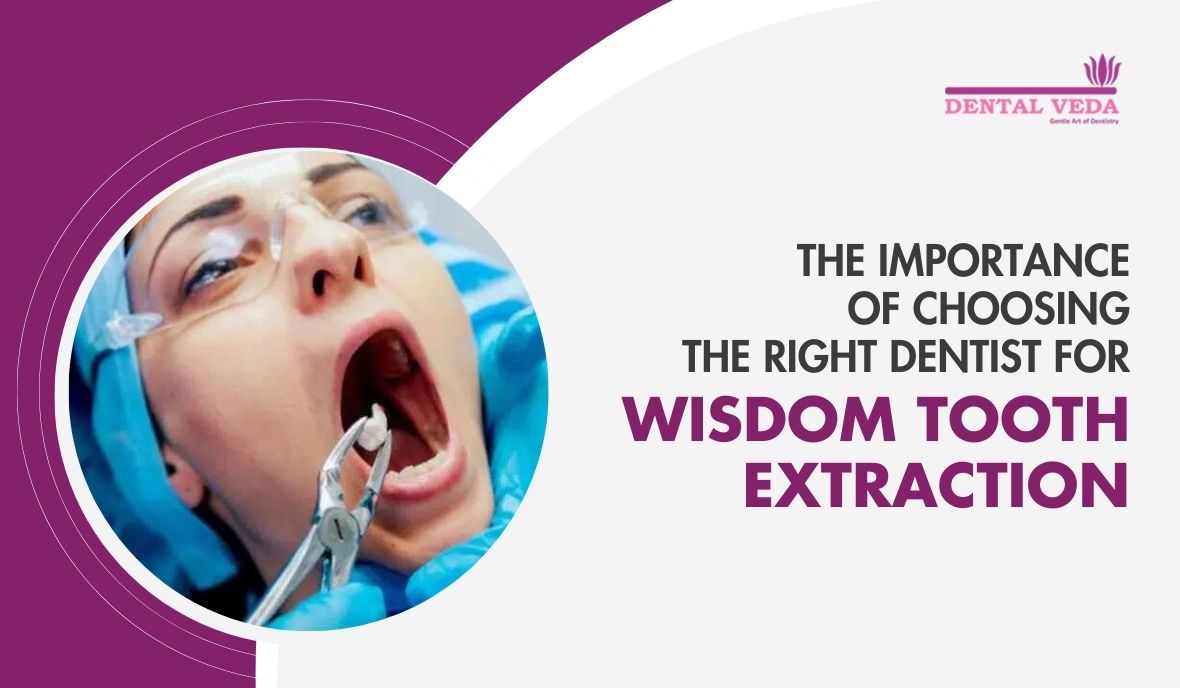A few dental health procedures instill much anxiety, such as wisdom tooth extraction. These third molars, often in late adolescence or early adulthood, can cause significant discomfort and lead to serious oral health issues if not properly managed. While the prospect of having these troublesome teeth removed might seem daunting, the key to a smooth, safe, and successful extraction lies in choosing the right dentist.
For several reasons, selecting a skilled and experienced dental professional for your wisdom tooth extraction in Sushant Lok is crucial. From minimizing pain and preventing complications to ensuring a quicker recovery and achieving optimal long-term oral health, the right dentist can make all the difference. This comprehensive guide will delve into why it’s essential to carefully choose your dentist for this procedure, what qualities to look for in a dental professional, and how the right choice can impact your overall dental experience.
Understanding Wisdom Teeth and Their Impact
What Are Wisdom Teeth?
Wisdom teeth, also known as third molars, are the last set that typically emerge in late adolescence or early adulthood, between the ages of 17 and 25. Most people have four wisdom teeth, one in each corner of the mouth.
Common Issues with Wisdom Teeth
While some people have no issues with their wisdom teeth, many others experience complications such as:
Impaction: When a wisdom tooth is trapped beneath the gum or only partially erupts.
Overcrowding: Insufficient space in the mouth, leading to misalignment of other teeth.
Infection and Decay: Difficulty in cleaning the back of the mouth can lead to cavities and gum disease.
Pain and Swelling: Persistent discomfort due to pressure on surrounding teeth and gums.
The Need for Extraction
Given these potential issues, dentists often recommend the removal of wisdom teeth to prevent further complications. The extraction process can vary in complexity, making the choice of dentist critically important.
Why Choosing the Right Dentist Matters?
Expertise and Experience: Wisdom tooth extraction can range from a simple procedure to a complex surgical operation, particularly if the teeth are impacted. An experienced dentist or oral surgeon will have the expertise to handle various scenarios, ensuring the procedure is performed safely and efficiently.
Minimizing Risks and Complications: A skilled dentist will take all necessary precautions to minimize risks associated with the extraction, such as infection, nerve damage, or excessive bleeding. Their expertise helps in managing these risks effectively.
Pain Management and Comfort: The right dentist will offer various pain management options, including local anesthesia, sedation, or general anesthesia, tailored to your comfort and anxiety levels. Their approach can significantly impact your overall experience and recovery.
Personalized Care and Follow-Up: Choosing a dentist who provides personalized care ensures that your needs and concerns are addressed. They will offer detailed pre-and post-operative instructions and follow-up care to monitor your recovery and address any complications promptly.
What to Look for in a Dentist for Wisdom Tooth Extraction
Credentials and Training: Ensure your dentist is properly licensed and has specialized training in oral surgery or wisdom tooth extraction. Look for certifications from reputable dental associations and boards.
Experience and Track Record: Inquire about the dentist’s experience with wisdom tooth extractions. An experienced dentist will have a proven record of successful procedures and satisfied patients.
Technology and Techniques: Modern dental practices use advanced technology and techniques to improve the precision and safety of wisdom tooth extractions. Look for a dentist who utilizes digital X-rays, 3D imaging, and minimally invasive surgical techniques.
Patient Reviews and Testimonials: Reading patient reviews and testimonials can provide insights into the dentist’s competence, bedside manner, and overall patient satisfaction. Positive feedback from previous patients is a good indicator of quality care.
Consultation and Communication: A good dentist will offer a thorough consultation, explaining the procedure, potential risks, and expected outcomes. They should be approachable, willing to answer your questions and provide clear instructions.
Office Environment and Staff: The dental office’s environment and the staff’s demeanor can greatly influence your experience. A clean, well-organized office with friendly and professional staff creates a positive and comfortable atmosphere.
Preparing for Wisdom Tooth Extraction
Initial Consultation
The preparation begins with an initial consultation, where the dentist will examine your mouth, take X-rays, and discuss the extraction plan. This is the time to address any concerns and understand the procedure in detail.
Pre-Operative Instructions
Your dentist will provide specific instructions to follow before the surgery. These may include:
Fasting: If you will be under sedation or general anesthesia, you may need to fast for a certain period.
Medications: Inform your dentist about any medications you are taking. They may adjust your medication regimen to avoid complications.
Transportation: Arrange for someone to drive you home after the procedure, especially if you will be sedated.
Mental and Emotional Preparation: Understanding the procedure and trusting your dentist can help alleviate anxiety. Practice relaxation techniques and ensure you have support from family or friends.
The Extraction Procedure
On the day of the surgery, follow your dentist’s pre-operative instructions carefully. Arrive at the dental office with time to complete the necessary paperwork and mentally prepare for the procedure.
Anesthesia Options: Depending on the complexity of the extraction and your comfort level, the dentist will use one of the following anesthesia options:
Local Anesthesia: Numbs the specific area of extraction, keeping you awake but pain-free.
Sedation Anesthesia: Administered through an intravenous (IV) line to calm you and make you drowsy.
General Anesthesia: Makes you unconscious throughout the procedure, used for more complex extractions.
The Extraction Process: The dentist will make an incision in the gum tissue to expose the tooth and bone. If removing the tooth in pieces is easier, it may be divided into sections. Once the tooth is extracted, the site will be cleaned, and stitches may be placed to promote healing.
Post-Operative Care: After the procedure, you’ll be monitored as the anesthesia wears off. The dentist will provide detailed post-operative instructions to manage pain and facilitate healing.
Recovery and Aftercare
Managing Pain and Swelling: Pain and swelling are common after wisdom tooth extraction. Your dentist will prescribe pain medications and recommend over-the-counter options to manage discomfort. Applying ice packs can help reduce swelling.
Dietary Guidelines: Stick to a soft-food diet for the first few days, avoiding hot, spicy, or crunchy foods. Gradually reintroduce solid foods as you heal. Stay hydrated, but avoid using straws, as the suction can dislodge the blood clot forming in the extraction site.
Oral Hygiene: Maintain good oral hygiene, but be gentle around the extraction site. Rinse your mouth with a saltwater solution to keep the area clean and prevent infection.
Follow-Up Appointments: Attend all scheduled follow-up appointments so your dentist can monitor your healing process and address concerns. They may remove stitches if necessary and ensure no signs of complications.
Signs of Complications: Be aware of potential complications such as dry socket, infection, or prolonged bleeding. Contact your dentist immediately if you experience severe pain, fever, or unusual swelling.
The Long-Term Benefits of Proper Wisdom Tooth Extraction
Prevention of Future Dental Issues: Proper extraction of problematic wisdom teeth can prevent future dental issues, including misalignment, crowding, and recurrent infections. This proactive approach saves you from potential pain and costly treatments.
Improved Oral Health: Removing wisdom teeth that risk your oral health contributes to a healthier mouth. It makes it easier to maintain proper oral hygiene, reducing the chances of cavities and gum disease.
Enhanced Quality of Life: Eliminating the pain and discomfort caused by problematic wisdom teeth can significantly improve your quality of life. You’ll be able to eat, speak, and smile with greater confidence and comfort.
Positive Dental Experiences: Choosing the right dentist for wisdom tooth extraction ensures a positive experience, fostering a trusting relationship with your dental care provider. This trust can encourage you to maintain regular dental check-ups and address other dental issues promptly.
Conclusion
Are you in need of wisdom tooth extraction in Sushant Lok? Look no further than Dental Veda, your premier Sushant Lok dental clinic. Our team of experienced dentists in Sushant Lok specializes in providing safe and effective wisdom tooth extractions, ensuring you receive the best care possible.
At Dental Veda, we prioritize your comfort and swift recovery. Don’t let wisdom tooth pain disrupt your life any longer. Visit Dental Veda today and experience top-notch dental care and a smooth tooth extraction recovery in Sushant Lok. Book your appointment now and take the first step towards a pain-free smile! (https://www.astor.com.pl/)


